Making Metal Great Again: How and Why Metal Music May Regain Mainstream Popularity
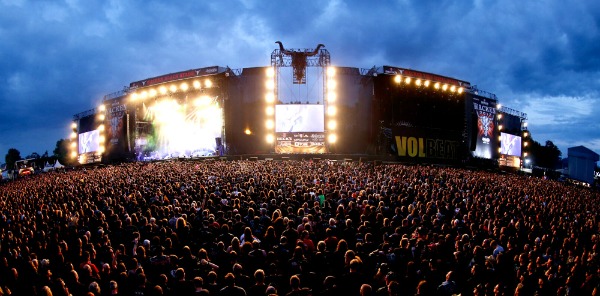
Mainstream success is somewhat of a complicated issue in metal circles. Some would argue that the genre needs mainstream popularity to attract listeners and cement new metal legends. Others argue that mainstream popularity creates sellouts and posers in the genre, thereby tainting what “true metal” is. This article is not meant to address this debate but rather the undeniable fact that metal has not had mainstream popularity in quite a few years. Some evidence of this is that metal bands have been more or less absent from the year-end Billboard Hot 100 for over five years. Additionally, one of the early contenders for metal single of the year for 2016 is not an original track but a cover of the folk rock song, “The Sound of Silence.”
This recent dip in popularity has led some to declare that the genre is dead, that it is now destined to be less important or current than other genres and will be viewed as somewhat of a relic for the remainder of its existence. While this assertion may ultimately be true, it does seem to overlook three important aspects of the genre. First, the metal genre has existed for almost 50 years and in that time it has proven to be resilient against lulls in popularity and the emergence of new types of music. Second, the genre has shown an ability to adapt to the tastes of new locations, technologies, and, most importantly, eras. For instance, industrial metal was able to use new technologies and strategies to create a new version of metal that appealed to late 90s audiences. Third, metal has a very strong base of “genre-junkies” (people that are fans of the genre and not just the odd artist in that genre) in both sheer size and quality. Metal concerts frequently still have some of the largest crowd numbers world-wide and, according to a study done by Spotify, metal fans are the most loyal fans in any genre. This indicates that the “rock-bottom” of the genre is still relatively high and that the path to mainstream success is that much shorter.
Of course, only time will tell which of these positions is the most accurate, but assuming that metal does make a mainstream comeback, the question still remains as to when and how it would happen. While it would be impossible to pinpoint an exact time and reason, this article will attempt to posit different scenarios that would contribute to metal regaining mainstream popularity.
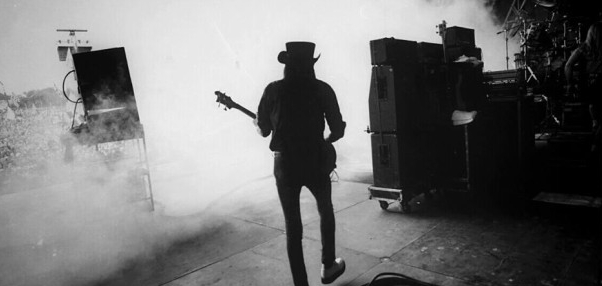
A New Wave
Mainstream popularity in music is frequently dictated by genre waves (new/innovative subgenres that gain sudden popularity) and metal is certainly no exception. Almost all of the genre’s previous popularity high-points coincided with a new wave such as the classic metal (Black Sabbath, Led Zeppelin) era in the late 60s/early 70s, the New Wave of British Heavy Metal or NWOBHM (Iron Maiden, Judas Priest) movement in the 80s, or the nu metal (Korn, Papa Roach) era of the early 2000s. One reason waves propel genres into mainstream popularity is because of a musical domino effect of sorts. If a listener becomes interested in one band, chances are that they would also like a band in the same sub-genre, then bands in the same subgenres as the first and/or second bands, and so on. As this continues, these fans increase the broad popularity of the genre and bring in other new listeners. Another reason waves are needed to make genres popular is that they address the ever present need to be relevant. Mainstream music is, with few exceptions, defined by what is trendy, and because of this the popular music charts are extremely fickle to artists and genres alike. New waves have the ability to make older genres more trendy, and thus more likely to succeed on the mainstream charts.
The current metal scene has failed to produce this necessary new wave for two reasons. One is that many of the newer subgenres of metal such as the New Wave of American Heavy Metal (Unearth, Shadows Fall), Swedish death metal (Entombed, Dismember), and goth metal (Tristania, Type O Negative), relative to other subgenres, have not become popular, often even within the metal community itself. Evidence of this is that most popular metal bands today are predominantly ones that were involved in waves that occured during or before the mid 90s (aka mostly over 20 years ago). The second reason is that the new metal bands that have become popular have not done so under a unified wave. This is evident in many metal genre-timelines which often end with the beginning of the New Wave of American Heavy Metal in the late 90s or early 2000s.
The popularity boosts during waves and the lulls in popularity associated with a lack of new waves seems to suggest that a new subgenre could significantly increase the mainstream popularity of the genre as a whole. Only time will tell what this new genre would sound like, however, a few possibilities come to mind. One would be to unify, promote, and expand many of the new folk metal bands like Alestorm and Amon Amarth into a New Wave of Folk Metal genre. Another possibility would be to revitalize the classic metal genre with bands like Ghost BC to create a Metal Renaissance movement. A further different possibility, would be to take technology and tropes from current popular music, like trap beats and heavy vocal modulation, in a metal context to create a sort of “popcore,” in much the same way Babymetal has used and remixed K-Pop into a unique form of metal. New waves, much like the other factors outlined in this article, would not guarantee the return of the genre in the mainstream, but it would certainly improve its chances.

More Mainstream Placements
Another factor in a genre’s ability to gain wide popularity is through mainstream placements. Mainstream placements are instances wherein a high viewer media product that is not music, uses an artist’s existing work on their soundtrack. For instance, a song being used on popular films, television, and/or commercial slots would be said to be receiving a mainstream placement. Mainstream placements build popularity in two ways. First and foremost, it gives a wide exposure to the song/band/genre being used. It should also be noted that in many instances this wide exposure has the ability to reach those that may be uninitiated into a certain kind of music, especially in instances where the band or genre is more obscure. The second way that placements help bands and genres gain popularity is by validating the material as acceptable mainstream culture. This is particularly important with metal as the oppositional or aggressive image of the genre often obscures the music itself and discourages new (and especially mainstream) listeners. Big placements and performance spots quell many of these concerns and makes unfamiliar genres “okay to like” or less scary.
One of the most prominent examples of the influence of mainstream placements in metal can be seen with Rammstein’s popularity in the United States. The band got its initial exposure to many American audiences in the David Lynch film Lost Highway, and boosted this popularity with additional placements in The Matrix and XXX (the latter of which containing a filmed performance). This, along with the subsequent festival performances and MTV music video air time, solidified Rammstein as one of the most popular touring bands in the United States despite the fact that the group is a heavy metal band that primarily sings in a language that is completely foreign to most Americans.
This kind of ascension through placements is becoming much more unrealistic for metal bands in recent years. Through either poor placements, less placements, unpopular placements, bad luck, or a combination of the four, metal bands (particularly the new ones) are not capitalizing on placements as much as other genres. More recently, the bands that have been given popularity due to placements have been either dance or ballad pop like Capital Cities and Bruno Mars or folk-indy bands like X-ambassadors. This is worsened by the fact that many classic rock/metal songs are starting to have their copyright expire, which would make them the obvious choices over similar new rock/metal songs that are under copyright.
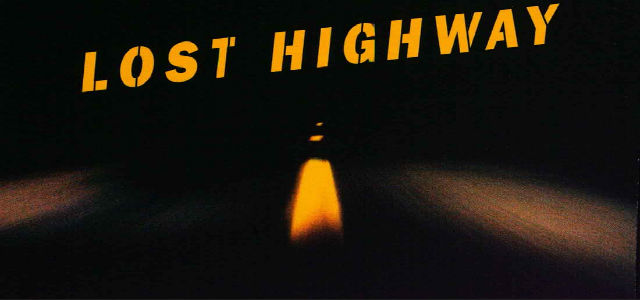
That said, the lack of copyright on old metal songs may ultimately be a blessing in disguise for new metal placements. The influx of newly copyright free music like classic metal may increase interest in the genre as a whole, leading to more placements for new metal and ultimately creating more popularity for the genre in the mainstream. The other possibility for increased placements is the success of a well known piece of media with a metal heavy soundtrack. As many people know, big budget media often repeats successes in terms of stylization and approach. Therefore if a piece of media was able to gain popularity and acclaim with a metal soundtrack, it is very possible that more films, television shows, and other high exposure placements could follow and, again, propel the genre into mainstream success.
The Inevitable Decline of Other Genres
As mentioned earlier, mainstream popularity in music is predominantly defined by what is trendy. As such, genres are in a perpetual race to become trendy, stay trendy, and become trendy again. An important thing to note is that the race to be trendy usually comes with distinct winners and losers. At any given time one could go through the pop-charts and come up with a fairly definite sense of what sound is “in” or “out.” The saving grace in all of this is that the music popularity race never ends and the winners and losers are always changing. Changes in position have certainly occurred from one genre taking the music world by storm, but many, if not most, of the changes have been spurred on in some part from the inevitable decline of the top genres. Using the race metaphor, genres frequently do not become popular because they run faster than the others, but because the leaders of the race get tired and fall back. Decline is inevitable for the top genres because trendiness, by its very nature, is fickle and simply cannot continue indefinitely.
This kind of “winning by not losing” has happened many times in metal’s history. For instance, the metal boom of the 80s which spawned the NWOBHM movement, thrash metal (Metallica, Slayer), death metal (Cannibal Corpse, Napalm Death), and many other subgenres, was done so in the wake of the disco, punk, and dance-pop movements of the late 70s and early 80s. Metal has also frequently replaced itself at the top of the charts. The most prominent example of this came in the 90s where grunge (Nirvana, Alice in Chains) became popular after the decline of hair metal (Def Leppard, Twisted Sister) and industrial metal (Marilyn Manson, Nine Inch Nails) became popular after the decline of grunge.
A general hypothetical situation would be that metal would return to mainstream popularity once any number of the currently trendy genres lose their appeal. And while this could certainly be the case, it seems as though metal’s main obstacle can be isolated to the trap subgenre. This is because trap is currently popular and, like metal, is an aggressive and oppositional genre. This means that trap not only takes away a spot as one of the trendy genres, but does so by proving a musical outlet to release aggression, something that has been a major asset of metal music. Therefore, a more specific situation for metal to regain popularity at the expense of another genre would be to capitalize on the inevitable decline of trap music.
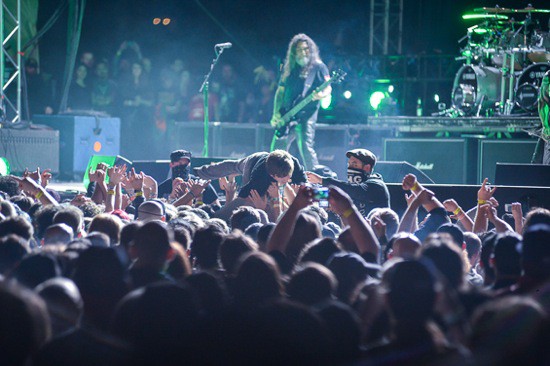
A New Opposition
Another potential factor keeping metal from regaining mainstream popularity is a lack of an opposing social force. As mentioned several times before, metal is an aggressive and oppositional form of music. The genre frequently needs some kind of social group, class, ideology to push against and have friction with to reach its full potential in mainstream culture. Traditionally, the groups opposed by metal have been high-brow music critics who initially believed the genre to be mindless noise, many groups of Christians who believed that metal was a threat to their religion or that it promoted Satanism, and conservative censorship groups that opposed the sexual and/or violent imagery the genre employed. The genre capitalized on this kind of opposition by providing an outlet for people were against these opposing groups which tended to grow in popularity with the amount of outrage cultivated. In essence, metal was able to make musical fandom a form of protest. One of the most prominent examples of opposition leading to popularity was seen in Marilyn Manson’s rise to popularity in the late 90s. The band was frequently able to serve as a form of protest against Christian and conservative censorship groups with their sacrilegious, anti-religious, pro-Satanic, highly sexual, and highly violent imagery. As outrage against the band grew (peaking with the Columbine shooting controversy) so too did the band’s popularity.
However, this relatively recent success in capitalizing on opposition has become less and less common as the traditional anti-metal groups become less threatening. Most high-brow music critics at the very least accept metal as a legitimate form of musical expression, the world is becoming more atheistic/agnostic and many if not most Christians are becoming more liberal (especially in terms of their relationship to media), and increased access to highly sexual or violent material online has made audiences desensitized and has turned traditional conservative censorship a relic of its former self. This of course raises the question of what group or ideology could be the future opposition of metal.
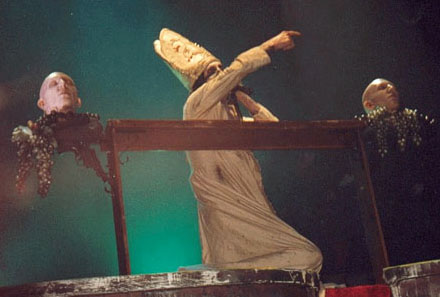
The groups involved would have to be frequently angered by something, have large numbers behind them, and be a group that is highly involved in media scrutiny. The two groups that come to mind under these conditions are both sides of the Political Correctness(PC)/Culture war. For those uninitiated, the current PC/Culture war is an internet based thought-conflict between the pro-PC/progressives and the anti-PC/anti-progressives. The pro-PC/progressive camp advocates for more diversity, better representation, and more progressive values in media while heavily criticizing those they contend to be regressive. The anti-PC/anti-progressives, on the other hand, advocate for free-speech and artistic freedom while quickly retaliating against much of the criticism the pro-PC/progressive camp gives to certain pieces of media. One need only look into the Ghostbusters (2016) trailer controversy to see that both sides get angry, have numbers, and hold a lot of value in media scrutiny.
Not only to both fulfill the general requirements of being a good cultural opponent, but they also fit into the larger picture of metal history. Opposing the pro-PC/progressive side would follow two metal traditions. One would be the destruction of what is considered “good taste,” the new version of which is currently being promoted by the pro-PC/progressive camp. The other tradition would be the retaliation against critics, as some on the pro-PC/progressive side have begun to criticize violent sexual imagery, misogyny, and bigoted language in the lyrics of metal songs. On the other hand, opposing the anti-PC/anti-progressive side would also follow the significant metal tradition of being anti-conservative. While being somewhat less objectionable than their previous incarnations, the anti-PC/anti-progressive camp is still the more conservative side of the PC/Culture war and opposing them would fall more in line with the traditional political affiliations of metal. The best conclusion to make is that either side would make for an excellent new foe to spur on the popularity of the genre. (It should also be noted that neither side is being advocated for/against but rather that both could be metal’s enemy of the future)
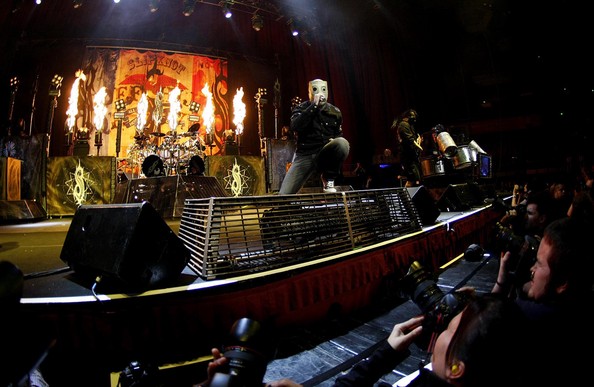
By analyzing each section, it has become apparent that an emerging wave, more mainstream placements, the decline of other genres, and the discovery of a new opposition could contribute to metal regaining its popularity in the mainstream. It has also become apparent that each of these are easily achievable, be it through the ways predicted or something similar. These things should also happen sooner rather than later if history holds true and metal fans continue their infectious enthusiasm and loyalty to the genre. However, the only way we will truly know what actually causes a metal resurgence and when is to wait and see. In the meantime, genre-junkies can take solace in the fact that a metal-free pop scene probably isn’t permanent.
What do you think? Leave a comment.











I love listening to the radio in the car with my sons and also noticed a metal free sound. This generation does have a different sound and the lyrics have a different tone. I have heard the kids talking about “classic rock” and some seem to know music from my generation, which was definitely metal. I think the classic metal pieces will always be relevant to every generation. Your article was a very nice enjoyable read. You really know your music.
What makes metal so awesome is that it is a self-sustaining community that thrives and evolves regardless of national or global trends.
Most metal is underground these days, with the exception of the metalcore genre.
This also seems to be part of the issue. I know many people, including myself, didn’t get into metal by listening to the most extreme/underground stuff off the bat (due to both accessibility and taste). There’s definitely going to need to be a “ramping up period before some of the harder or more underground stuff can get the attention it deserves.
Aggressive music seems to work in a cycle. The most aggressive music never reaches mainstream popularity, but some aggressive music does. It then gets commercialized and becomes less heavy. The fans of aggressive music then ditch that and find a new form of aggressive music to meet their needs.
Demographics is a huge problem for modern metal. It’s too dependent on males in their 20’s and under. Everyone buys pop music. Blacks, whites, Asians, hispanics, men, women, teens to people in their 40’s and 50’s, straight and gay. Metal has to find a way to appeal to a wider demographic to become relevant again. Maybe as people become more used to hearing metal, they’ll embrace it more.
Good point! Demographics have been an issue for the metal genre for much of its history. However, recently it seems to be expanding its horizons so to speak. Metal has begun to be adopted and localized throughout the globe (as seen in Sam Dunn’s Global Metal documentary), bands like Mutoid Man and Ghost BC evoke a strong classic metal sound which can appeal to older audiences, and female fronted bands like Arch Enemy, Nightwish, or In This Moment are gaining in numbers and popularity (which is a reflection of the genre’s increasing popularity amongst women). This is in addition to a long history of gay acceptance and prominent gay performers like Judas Priest’s Rob Halford. The main problem the genre seems to have now is to gather these diverse demographics under one band or subgenre (as opposed to certain bands/subgenres being held down as “blank-kind-of-metal”).
I have noticed rap’s appeal to a worldwide audience. Even the latest video put out by China is quite amazing. For some reason rap seems to cross the demographic divide.
Interesting topic….and one I haven’t really considered. Yes,I am quite fed up with what is deemed “music,” today, but as for the genre of metal music, I haven’t really considered it in years. I grew up listening to Guns n Roses, Def Leppard, etc., but I now tend to stick with more subtle bands, such as the Foo Fighters, Pearl Jam, STP, Jane’s Addiction, basically, not metal. I would love to see a comeback of metal dominating the mainstream music scene. That would be amazing!!!
I hope metal would get a new leap.. It would be nice to experience something else than modern pop.
I hope to god it does and i hope it replaces this stupid emo and death metal and grundge.
Metal is one of the most popular genres of music, and always had a faithful crowd.
I think there’s an endless cycle of “alternative” music getting co opted and ruined by big business so that people get sick of it — and then then the next generation of “alternative” music is born or makes resurgence as people turn away from the over-popularized/over-commercialized stuff.
I love metal.
When people say “rock is dead,” or “metal is dead,” they’re just referring to its lack of presence on today’s pop radio stations or major music award shows.
Younger musicians (metal and rock) rarely take the time to arrive at rock or metal. You need righteous pedagogy before you can select a genre, you need unshakable fundamentals, then you can start your journey.
Metal has undergone kind of a shift since the 70s.
Metal music has always sounded a bit too much for me. I have no problem against people who like it, though. To each their own.
I actually don’t think metal was really in decline. There are still plenty of good commercial alternative metal and mainstream metal stations out there with plenty of newer bands.
I can’t wait for the day when an excellent band comes around and brings everyone together.
Cool read, nice job!
My personal favorite genre is Rock and I don’t believe rock has ever died. It was more in a hibernation state than anything (the rock I’m referring to is the 70’s style). Obviously you have bands like Nirvana, Pantera, anyone you can name that have some groove or old school heaviness, but again, the 70’s style of music seems to have just started back up.
It’s all about the damn time!
What about bands like Bring Me the Horizon A day To Remember and Asking Alexandria you didnt mention this sub genre in your article and these are all fairly new bands that formed in the later 2000s that are very popular get some radio play and are tchnically a sub genre of metal
I briefly mentioned the New Wave of American Heavy Metal which would likely include BMTH, ADTR, and Asking Alexandria (and I actually wanted to expand on metalcore a bit but it turns out that its a much older subgenre than I initially thought). Admittedly, I didn’t spend too much time on it and probably should have fleshed it out a bit more. However, the problem remains that big bands now aren’t reaching the same mainstream as big bands from years ago. This is evident in both mainstream chart success and big concert festival line-ups which frequently place older, and more popular, headlining bands in front of newer ones. Another big indicator is simply how many non-genre junkies would know who Asking Alexandria or BMTH is vs. how many would know who Metallica or Nine Inch Nails is. (I should also note that popularity does not equal quality and that the genre has definitely not seen a dip in skill as evidenced by new bands like the ones you mentioned)
Hopefully, people will start to get sick and tired of the whole rap craze that’s been around and will want to get back to something that’s a little less wacky.
It’s hard not to miss the glory days of heavy metal.
What an accurate postmortem, very observant.
I use the internet to listen to a lot great metal music. I never stopped listening to metal after declined of it. Mainstream radio is dying or dead. The internet is now the place to listen to what music you enjoy listening to. The nice thing is I get to choose the music I want without being limited to the radio stations in my city or town.
I think metal is not fun anymore. its gotten very seriously and since anyone can shred these days, its gotten so competitive that the only thing they do have is technical.
The biggest issue is that the people who make pop music popular do not want to see metal right now in the mainstream (or it seems).
It doesn’t really need to. Metal is better at being in the underground and a lot of quality bands are on the underground. I’m not a metal elitist but Music is a extremely rewarding medium when you actually explore it and Metal is no exception. If I didn’t explore what Metal is capable of instead of the mainstream, I wouldn’t known bands such as Opeth, Ne Obliviscaris, Mastodon, Omnium Gatherum, Alcest, Porcupine Tree, Scar Symmetry and much more.
People need to realize that Metal’s peak of popularity was when Metallica released their Black Album and it will never happen again.
I think this article is great.
Rock and Metal are coming back, Disco went away and no one found a replacement for it until hip hop came along and destroyed music and what it stands for, it’s stupid to think that anyone would want to listen to liberal hip hop artists because everyone’s fed up with the whole “This is different” scene. People want something new and with Rock and Metal making a comeback, it’ll only get better and better.
Made my day.
Long live metal music! FOREVER!
It’d be amazing to see 70s and 80s styled Rock N Roll back especially for the ones who weren’t alive to experience the awesomeness. I also wouldn’t mind seeing 80s and 90s Hip Hop making a comeback and stepping on the fake hip hop too
One problem I notice in metal is that there’s a serious lack of innovation. Metal has become so insular that it refuses to incorporate outside genres.
The reasons vary, but I think we have to stop thinking in genres. Music is music, and part of what makes good music to me is innovation. Deafhaven’s Sunbather caused its media-stir partially through breaking down musical barriers. I want to see more of that.
What if I could incorporate flamenco rhythms with a fuzzy Electric Wizard guitar tone? That could be a start for anyone willing to make some new rules.
To add to my previous comment, if more people took what they like the most from ANY music they like and applied it, innovation would skyrocket.
Thanks for writing about this! I’ve been a fan of metal, rock ‘n roll, and all related genres for my whole life. I’m always happy to read about what others think of this music. That said, there are some problems with your article that I’d like to point out. My apologies if this comment post becomes a bit long, but I’ve quoted specific sections of the article to clarify where my thoughts come from and what I’m reacting to. I hope this helps! 🙂
“This recent dip in popularity has led some to declare that the genre is dead, that it is now destined to be less important or current than other genres and will be viewed as somewhat of a relic for the remainder of its existence. While this assertion may ultimately be true, it does seem to overlook three important aspects of the genre.”
-need to also present the reasons why I may be true, not just why it isn’t. You only went on to refute this argument instead of presenting adequate support for both sides.
Can you specific more of what is “mainstream?” So far, “mainstream success” in this article has only been related to inclusion in the Billboard Hot 100. I would imagine that there are a lot more statistics/examples to use here. Define your terms!
“Mainstream music is, with few exceptions, defined by what is trendy, and because of this the popular music charts are extremely fickle to artists and genres alike.”
-perhaps providing an actual dictionary definition of the word “mainstream” could serve to back up this point. I only say so because the word “mainstream” can have different meanings in different contexts, especially when discussing musical genres. As a classical musician by training, and a metal/punk guitarist and bassist, the word means entirely differently things when I interact in different circles. In classical music, it normally refers to “standard,” or frequently-performed, repertoire and the interpretive pathways that large numbers of performers follow. In metal and punk, it refers to the most popular bands or styles.
“The current metal scene has failed to produce this necessary new wave for two reasons.”
-I strongly disagree. Djent, as pioneered by Meshuggah and brought to popularity by bands like Periphery and Tesseract, is surging in popularity in the metal community. I also have many friends whom have discovered this music on their own and whom listen primarily to classical music or hip-hop. Metalcore, and before that “screamo,” was also doing really well for a while.
-Also, do you have access to any research or statistics that could back up this perceived lack of a new wave of metal? If anything, I’d venture to say that “new waves” are things of the past, with the rise of streaming services. Such platforms allow fanbases to become more tightly knit and for subgenres to strengthen (because of the “related artists” feature), which I don’t really see as a detriment to the wider umbrella of metal. It will never die as a genre, but I think the idea of “mainstream music” is losing more and more credibility as time goes on because people are becoming more specialized with what they listen to.
“The second way that placements help bands and genres gain popularity is by validating the material as acceptable mainstream culture. This is particularly important with metal as the oppositional or aggressive image of the genre often obscures the music itself and discourages new (and especially mainstream) listeners. Big placements and performance spots quell many of these concerns and makes unfamiliar genres “okay to like” or less scary.”
-So mainstream culture is supposed to avoid being “scary?” I don’t know how much I can get on board with this. There are plenty of “mainstream” movies, books, tv shows, and whatnot that scare the pants off people. The Saw movies are a great example of this.
-I think it is more about the community of metal fans being overly aggressive than it is about the music itself. If a community is welcoming, someone will feel more inclined to engage with it.
“That said, the lack of copyright on old metal songs may ultimately be a blessing in disguise for new metal placements. The influx of newly copyright free music like classic metal may increase interest in the genre as a whole, leading to more placements for new metal and ultimately creating more popularity for the genre in the mainstream. The other possibility for increased placements is the success of a well known piece of media with a metal heavy soundtrack.”
-Good points here!
“As mentioned earlier, mainstream popularity in music is predominantly defined by what is trendy. As such, genres are in a perpetual race to become trendy, stay trendy, and become trendy again.”
-Do you have any musical examples of what this means? Popular/trendy rhythms, use of specific instruments, vocal styles, lyrical references, etc.?
“As mentioned several times before, metal is an aggressive and oppositional form of music.”
-wrong. Exmaples:
“I’m the harbinger, not the author of these timeless words.
Led by the Comforter I sing to you.
And if my throat were to be cut from ear to ear, I hope that these words
would carry on in these songs that I pray you sing one day.
We sing for you. We sing for you. We sing for you. We sing for you.
We sing for you. We sing for you. We sing for you. We sing for you.” – August Burns Red, “Leveler”
“With screams over silence taking place of the violence,
Standing together, we are never alone.” – The Ghost Inside, “Unspoken”
“Heavy eyes but a tongue won’t stutter
Mouths are moving and this heart’s still fluttering
I’m on my own
You found me in the cold, now I am
Wrapped within the warmth of your touch
There’s never a moment that I’d let slip by, in your eyes
Are we growing old day and day?
Am I melting in the rays of this love?
Never ever gonna let you go
Don’t let go” – Periphery, “Lune”
So, lots of happy and inspirational lyrics here. If you are referring to the sound of the music, you should specify why it is “oppositional” and “aggressive” in musical terms. You can’t just reiterate stereotypical descriptions of metal when you are trying to advocate for it’s return to popularity with a greater audience.
In general, this article is lacking real concrete analytical examples of each point that is made. I think with more historical background, musical examples (clips or references to exact songs), and clearer definitions of words like “mainstream,” “popularity,” and the like, you would have a really interesting profile on your hands. As it stands now, there is a dependence on the audience knowing vaguely what such terms mean in a general sense, which makes the article flounder in terms of structural support and argumentative strength. It’s a common tenet of writing instruction to encourage writers to “define their terms,” so that there is no confusion as to what you are discussing.
I also don’t think that the future is so bleak for metal, it’s actually becoming more interesting and diversified all the time as gear becomes more advanced and musicians get better. There will also be an insane number of subgenres with it, as there is in indie rock/folk, which, in my opinion, strengthens it. So, why does it need to become mainstream? Perhaps that’s a question which is important to address. Is it absolutely vital or important for metal to be a popular genre again, or does more creativity and progress happen outside of the Hot 100? I’d venture to say the latter is true 🙂
I think that what constitutes metal is really going to be at the core of the debate. We have seen new forms of ‘metal’ trends gain mainstream popularity over the last 10 years. Think Emo. However, much of the metal community would say that this isn’t metal at all, it is weak and goes against everything that metal stands for (myself included). So although metal may become mainstream, the capacity in which it manifests is always highly contested.
If only I grew up in a time when Led Zeppelin and Black Sabbath were being played on the radio. I do hope metal becomes mainstream again so kids of the next generation appreciate music that isn’t just made on a computer.
The problem is there’s so many different sub-genres that people just think of the one umbrella term of ‘metal’ and immediately reject it and deem it as inaccessible.
was the title of this article supposed to be a play on MAGA?
Cool article my favorite band has gotta be Slipknot
I hope with this olympic and paralympic games the visual kei, metal and rock from Japan invades the world. They are like very good high quality heirs to metal and rock music, doesnt metter that is on another language that is not english.
Although pop and other genres are so important in Japan too, metal and rock dont lose their place there, they can reach the charts.
Even pop music is high quality there.